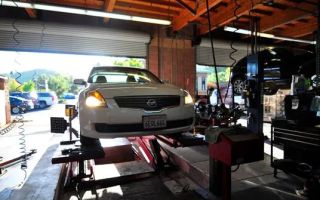How to Safely Replace a Flat Tire with a Donut Spare
There’s nothing quite as frustrating as finding yourself with a flat tire when you're on the road. Whether you’re heading to work or on a long road trip, a flat tire can throw your day off course. However, knowing how to safely replace a flat tire with a donut spare can save you time and get you back on the road quickly. In this article, I’ll walk you through the steps I take when changing a flat tire, sharing personal insights and tips to ensure the process is as smooth and safe as possible. Let’s dive in!

MR. TIRE INC.
2078 New York Ave, Huntington Station, NY 11746, USA
1. The First Steps: Ensure Your Safety
Before I even think about lifting the car or removing the flat tire, my top priority is always safety. A flat tire typically means I’ve pulled over to the side of the road, and the last thing I want is to put myself in a dangerous situation. The first thing I do is make sure my car is on a flat surface, away from traffic as much as possible. I try to pull over to the shoulder or into a parking lot, if possible.
I also make sure the car is turned off and the parking brake is engaged. This is essential to prevent the car from rolling while I’m working on it. I keep my hazard lights on to make sure I’m visible to other drivers, especially in low-light conditions. Then, I get out my tools and the donut spare, which is typically located in the trunk under the floor mat or in the cargo area.

MR. TIRE INC.
2078 New York Ave, Huntington Station, NY 11746, USA
2. Gathering the Right Tools and Equipment
Next, I make sure I have everything I need. Here’s a list of the essentials that I’ve found to be invaluable during a tire change:
- Donut spare tire: This is your temporary tire that will get you to a mechanic. It’s important to note that a donut tire is not designed for long-term use, so you should aim to get your regular tire fixed as soon as possible.
- Jack: This is used to lift the car off the ground. It’s typically part of your car’s emergency kit.
- Lug wrench: This tool is necessary for loosening and tightening the lug nuts on the tire.
- Wheel chocks: These are placed in front and behind the tires to prevent the vehicle from rolling.
- Flashlight: If it’s dark or if you’re working in low visibility, a flashlight can be crucial for seeing what you’re doing.
Before I get started, I check that all my tools are in good condition. The last thing I want is to have a tool break or malfunction while I’m in the middle of the task. If the weather is bad, I might also throw on gloves or a rain jacket to stay comfortable.
3. Loosening the Lug Nuts
Once I’ve set up everything and ensured my safety, it’s time to begin the process. I start by using the lug wrench to loosen the lug nuts on the flat tire. The key here is not to remove the lug nuts completely, but just to loosen them. I find it’s easier to do this while the car is still on the ground, as it prevents the wheel from spinning.
To do this, I position the lug wrench on the first lug nut and apply pressure in a counterclockwise direction. If the lug nuts are stubborn, I use my body weight for extra leverage. Once I’ve loosened all the lug nuts, I move on to the next step.
4. Lifting the Vehicle
Now comes the moment when the car needs to be lifted off the ground. I use the jack to lift the car. I place the jack under the car’s jacking point, which can be found in the owner’s manual or often marked on the vehicle’s frame. It’s critical to make sure the jack is positioned correctly, as it ensures that the car will be lifted safely and won’t tip over.
I then slowly begin lifting the car by turning the jack handle. I keep an eye on the car’s position, ensuring that it stays stable as it rises. I lift the car until the flat tire is off the ground, and there’s enough clearance to remove the tire.
5. Removing the Flat Tire
Once the car is lifted, I go back to the lug nuts. At this point, I can fully remove them. I remove the first lug nut and place it in a safe spot where I won’t lose it. Then, I remove the rest of the nuts in the same way. Once all the nuts are off, I take the flat tire and pull it off the car.
When removing the tire, I make sure to lift it straight off the wheel hub to avoid any damage. I also make sure not to let the flat tire roll away, so I keep it close to me. Now that the flat is off, it’s time to install the donut spare!
6. Installing the Donut Spare
Now, I carefully take the donut spare and align it with the wheel hub. It’s important to match the holes in the tire with the bolts on the hub. I start by pushing the tire onto the hub, ensuring that it sits flush against the wheel. Once it’s in place, I begin hand-tightening the lug nuts onto the bolts. I don’t tighten them all the way yet, as I’ll do that once the car is lowered.
At this point, it’s important to double-check that the donut spare is sitting securely. I’ve had experiences where the tire wasn’t properly aligned, so I always make sure it’s in place before lowering the car.
7. Lowering the Car and Tightening the Lug Nuts
With the donut spare in place and the lug nuts loosely attached, I’m now ready to lower the vehicle. I carefully lower the car by turning the jack handle in the opposite direction. As the car lowers, I make sure it comes down evenly and slowly until the tire touches the ground.
Once the car is fully lowered, I use the lug wrench to tighten the lug nuts securely. I always tighten them in a crisscross pattern to ensure an even distribution of pressure. I go through all the nuts and make sure they are tight enough that the tire won’t come off while driving.
8. Final Checks and Cleanup
After everything is tightened, I do a final check to make sure all the tools are packed up, and the flat tire is safely stored in the trunk. I also take a quick look at the spare tire’s pressure to ensure it’s properly inflated. Donut tires are usually designed for temporary use, so I make sure to head to the mechanic as soon as possible to get a proper replacement.
Finally, I drive away with a sense of accomplishment and relief, knowing that I can now safely continue my journey. However, I remember that the donut spare is not meant for long distances or high speeds, so I keep my driving speed under 50 mph and avoid long trips until I can replace the tire properly.
If you need assistance with tire changes or other road emergencies, consider visiting Rescue & Towing for professional help.























